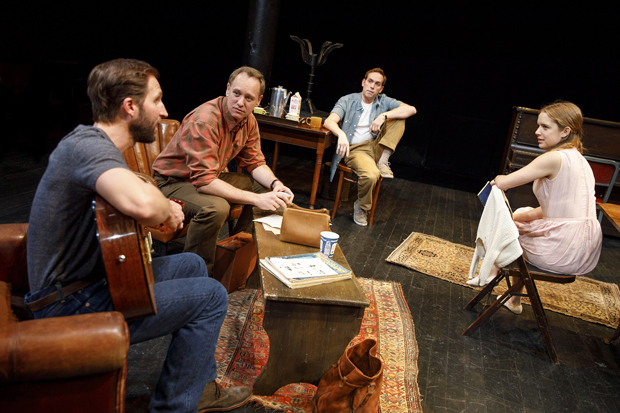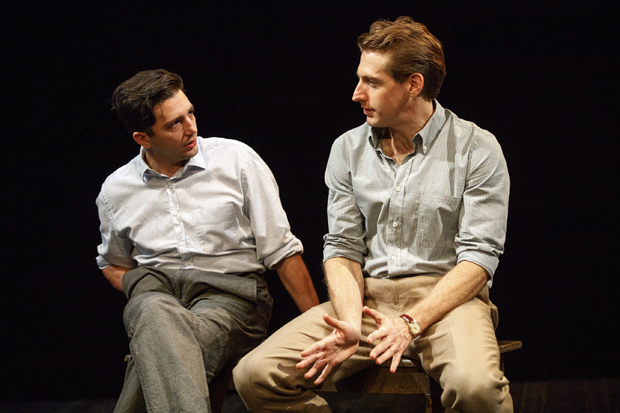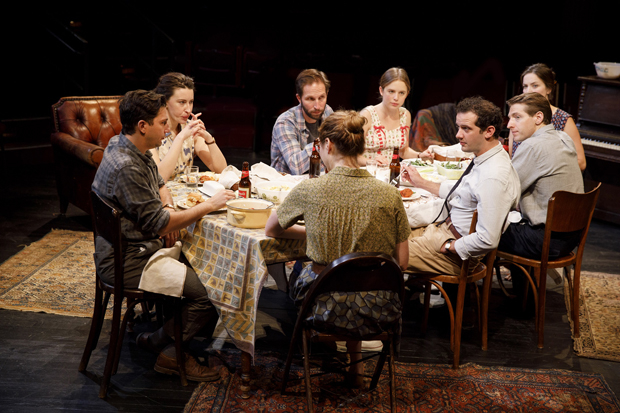Illyria

(© Joan Marcus)
It all seems so real: the way the actors speak in hushed tones with their backs to the audience, as if they’re not even in a theater at all. For the past decade, writer and director Richard Nelson has been America’s foremost purveyor of voyeur theater. His multipart Apple Family and The Gabriels plays invited audiences at the Public Theater to spy on the inner sanctums of two different families from Rhinebeck, New York. He now applies his relentlessly realistic methods to the story of the Public Theater and its founder, Joseph Papp, with Illyria. As with previous Nelson endeavors, audiences will recognize a deep humanity and quiet perseverance in the play — if they can manage to stay awake.
It’s actually impressive how Nelson is able to provoke big yawns and droopy heads with such a fascinating tale: It is 1958 and Joe Papp (John Magaro) is struggling to save his fledgling New York Shakespeare Festival. All-powerful New York City parks commissioner Robert Moses is pressuring Papp to charge admission to his free summertime performances, citing the damage audiences are doing to the lawn in Central Park. Papp knows that this will lead to a death spiral of declining audiences and funding. Also, he fundamentally believes that theater should be free for all, especially when performed in a public park. One of Papp’s frequent collaborators, director Stuart Vaughan (the effortlessly smarmy John Sanders), thinks Papp needs to grow up: Free Shakespeare was always just a stepping-stone to real, well-paying jobs in the theater. Papp vehemently disagrees, and those of us who still enjoy Shakespeare in the Park every summer are very glad for that.

(© Joan Marcus)
Nelson populates his drama with a cast of real characters: composer David Amram (Blake DeLong), press agent Merle Debuskey (Fran Kranz), and future Public Theater executive director Bernie Gersten (Will Brill), among others. Their aggressively mild portrayals leave us with the aftertaste of mayonnaise: We never get a real sense of any of them. Even a casting decision between Peggy Papp (Kristen Connolly in a saintly portrayal of the Public's first lady) and Mary Bennett (Naian González Norvind) fails to spark any real drama. Only the conflict between Papp and Vaughan stands out in a way that feels relevant to the meat of the story, which is about the radical idea that the arts should belong to everyone.
It is an admirable task to pull heroes like Papp off their pedestals and reveal them to be the flawed, prickly individuals they often are (the melancholic and pugnacious Magaro excels at showing this). Unfortunately, in pursuit of realism, Nelson downplays the stakes of this vitally relevant story. When the arts are under attack and public space is increasingly privatized, we need to fight back. The David and Goliath tale of the New York Shakespeare Festival versus Robert Moses is an inspiring one that would be better served by the epic theatrical forms most favored by Papp and his disciples. As told by Nelson, it drowns in a sea of passive-aggressive slights, icy stares, and pregnant pauses.
Visually, Illyria is indistinguishable from any of Nelson’s plays over the last decade: White people clad in earth tones whisper around a table while enjoying a meal of meatballs and macaroni salad. Susan Hilferty and Jason Ardizzone-West provide a stack of mismatched wooden furniture, which the actors assemble into a functional set during the first few minutes as a song by the Decemberists plays over the speakers (clichéd sound design by Scott Lehrer). Hilferty also designs the costumes, which have the authentic wear and tear one would expect for a bunch of besieged thespians. Jennifer Tipton’s lighting gives everything a vague sepia quality, betraying the fact that while Illyria has all the trappings of reality, it is actually burying the Shakespeare Festival's story in hazy nostalgia.

(© Joan Marcus)
The most disappointing thing about Illyria is the inconclusive note on which it leaves us. Papp, Gersten, and Debuskey look into the approaching darkness as a summer rain pours down on them and their makeshift stage in the park. "It’s our f*cking city too," Papp shouts, defiant in spite of an unclear path ahead. That’s a feeling that many in the audience likely share, which makes it a shame that we never get to see exactly how Papp triumphed in the end. Perhaps Nelson plans a multipart saga to tell that story, but based on this self-involved and digressive overture, we don't have high hopes for the future.










